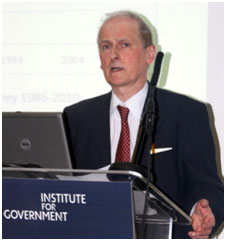Explorations in Governance
Christopher Hood’s study of executive government spans over four decades. Over this time, questions relating to the ‘machinery of government’ have rem
Event summary by Ruth Dixon and Martin Lodge
What makes government ‘work better and cost less’ – and how do we find out?
These questions exercise both academics and officials at the present time. And they were the questions posed at an Institute of Government symposium on 16 March 2012. The ‘excuse’ for the event – if such were needed – was the sixty-fifth birthday of Professor Christopher Hood (University of Oxford). Christopher’s colleagues and former students attended from all over the world, and the mix of policy-makers and academics made for stimulating discussions.

Panellists Peter Thomas, Helen Margetts, Alison Brimelow, Oliver James, Alison Wolf
Audit - costs and benefits
Panel sessions on Performance and Bureaucracy and Governance and Risk allowed exploration of questions such as how do we assess the costs versus the benefits of the ‘audit society’? What are the roles of risk and blame in setting the reform agenda? And how do reforms impact on contemporary central government?
As Oliver James (Exeter) and David Heald (Aberdeen) pointed out, we know, for instance, how much disbanding the Audit Commission will save each year (though some of its functions will have to be paid for in other ways) but how do we assess the counter-factual – what savings will be foregone through not being identified by the auditing process? Jeremy Lonsdale (National Audit Office) pointed to the considerable learning that had taken place in audit functions over the past two decades or so.
Big data
Can we use new sources of data? Helen Margetts (Oxford Internet Institute) described the potential of ‘big data’ – the massive amounts of digital information generated when citizens interact with government online. If we can develop ways of handling the astronomically large datasets (and avoid compromising privacy and security) we could gain a far more timely and fine-grained understanding of citizens’ preferences and actions than from surveys and samples. Could such data replace some of the traditional metrics for assessing performance?
Risk and blame
And how much reform is actually driven by the fear of blame? Mary Dixon-Woods (Leicester) described the so-called tombstone effect in the case of patient safety; poorly thought-out reforms introduced in the wake of disasters with the intention of dealing with specific risks but which often have the effect of apportioning blame. Similarly Will Jennings (Manchester/Southampton) noted how mega-events, such as the Olympics suffered from a number of paradoxes, with risk management quickly turning into blame management.
Four decades of reform in Whitehall
Whereas Peter Thomas (IfG) and Alison Wolf (KCL) pointed to tensions in contemporary central government and public sector reforms, the keynote speech by Christopher Hood focused on a longer time-scale: if we look back over the last four decades, can we find evidence of the UK government either ‘working better’ or ‘costing less’? What were the effects of reform measures, such as changes in management style and performance target regimes? It is difficult to find indicators that remain stable over time, and Christopher Hood described some of the detective work that he and his colleague Ruth Dixon have done in finding data that could be compared over decades, when the basis for evaluation often changes from year to year.
Works better and costs less?
 In terms of ‘working better’ Christopher Hood showed that trust in government has declined not only in the UK, but also in the USA and Europe. The numbers of complaints to ombudsmen and applications for judicial review have also increased. But, as Perri 6 asked in the discussion, is this because government is ‘getting worse’ or because people are becoming less deferential?
In terms of ‘working better’ Christopher Hood showed that trust in government has declined not only in the UK, but also in the USA and Europe. The numbers of complaints to ombudsmen and applications for judicial review have also increased. But, as Perri 6 asked in the discussion, is this because government is ‘getting worse’ or because people are becoming less deferential?
And does the UK government machine ‘cost less’ than it did 40 years ago? Departmental administration costs and the costs of collecting taxes showed real-terms increases in each decade since 1980 (at the same time that reforms such as outsourcing and massive IT projects were intended to cut costs). The civil service paybill is at about the same level in real terms as it was in 1980, though the number of civil servants has fallen markedly.
In the current period of austerity, Whitehall has a target of cutting administration costs by 34% in four years. Christopher Hood showed that there was no period in the past four decades that came close to this reduction. The nearest approach was in the final four years of John Major’s government in the mid-1990s when all of the indicators moved in the direction of cost savings, but these changes were soon reversed under Tony Blair. Has the present administration realised the scale of the challenge it faces?
Explorations in Governance: a collection of papers in honour of Christopher Hood, edited by Ruth Dixon and Martin Lodge, accompanied the symposium. This publication is available on Christopher Hood’s Reshaping Executive Government website.
Ruth Dixon is at the Department of Politics and International Relations at the University of Oxford, and Martin Lodge is Reader in Political Science and Public Policy at the LSE.
- Keywords
- Data and digital Civil service reform
- Publisher
- Institute for Government